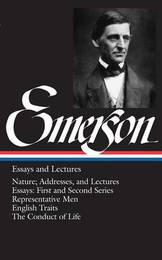
|
Ralph Waldo Emerson: Essays and Lectures (LOA #15): Nature; Addresses, and Lectures / Essays: First and Second Series / Represen
Hardback
Main Details
| Title |
Ralph Waldo Emerson: Essays and Lectures (LOA #15): Nature; Addresses, and Lectures / Essays: First and Second Series / Represen
|
| Authors and Contributors |
By (author) Ralph Waldo Emerson
|
| Series | Library of America Ralph Waldo Emerson Edition |
|---|
| Series part Volume No. |
1
|
| Physical Properties |
| Format:Hardback | | Pages:1150 | | Dimensions(mm): Height 206,Width 127 |
|
| Category/Genre | Literary essays |
|---|
| ISBN/Barcode |
9780940450158
|
| Classifications | Dewey:818.308 |
|---|
| Audience | | Undergraduate | | Postgraduate, Research & Scholarly | | Professional & Vocational | |
|---|
|
Publishing Details |
| Publisher |
The Library of America
|
| Imprint |
The Library of America
|
| Publication Date |
15 November 1983 |
| Publication Country |
United States
|
Description
Our most eloquent champion of individualism, Emerson acknowledges at the same time the countervailing pressures of society in American life. Even as he extols what he called "the great and crescive self," he dramatizes and records its vicissitudes. Here are all the indispensable and most renowned works, including "The American Scholar" ("our intellectual Declaration of Independence," as Oliver Wendell Holmes called it), "The Divinity School Address," considered atheistic by many of his listeners, the summons to "Self-Reliance," along with the more embattled realizations of "Circles" and, especially, "Experience." Here, too, are his wide-ranging portraits of Montaigne, Shakespeare, and other "representative men," and his astute observations on the habits, lives, and prospects of the English and American people. This volume includes Emerson's well-knownNature; Addresses, and Lectures(1849), hisEssays- First Series(1841) andEssays- Second Series(1844), plusRepresentative Men(1850),English Traits(1856), and his later book of essays,The Conduct of Life(1860). These are the works that established Emerson's colossal reputation in America and found him admirers abroad as diverse as Carlyle, Nietzsche, and Proust.The reasons for Emerson's influence and durability will be obvious to any reader who follows the exhilarating, exploratory movements of his mind in this uniquely full gathering of his work. Not merely another selection of his essays, this volume includes all his major books in their rich entirety. No other volume conveys so comprehensively the exhilaration and exploratory energy of perhaps America's greatest writer. LIBRARY OF AMERICAis an independent nonprofit cultural organization founded in 1979 to preserve our nation's literary heritage by publishing, and keeping permanently in print, America's best and most significant writing. The Library of America series includes more than 300 volumes to date, authoritative editions that average 1,000 pages in length, feature cloth covers, sewn bindings, and ribbon markers, and are printed on premium acid-free paper that will last for centuries.
Author Biography
Ralph Waldo Emerson(1803-1882) settled in Concord, Massachusetts, in 1834, where he began a career as a public lecturer. Every year Emerson made a lecture tour, the source of most of his essays. His principal publications include Nature(1836),two volumes of Essays (1841, 1844), Poems (1847), Representative Men (1850), The Conduct of Life (1860), and Society and Solitude (1870). Joel Porte(1933-2006), volume editor, won the Bowdoin Prize in 1962 for his essay on Emerson, and was granted the Distinguished Achievement Award by the Emerson Society in 2006. He authored many studies of nineteenth-century and modern literature, includingEmerson and Thoreau- Transcendentalists in Conflict, The Romance in America, andRepresentative Man- Ralph Waldo Emerson in his Time.
Reviews"The Emerson who speaks to us through these essays understood America as few have done before or since. By nature a dualistic thinker, he fully realized the polarities of American experience-between action and reflection, self-reliance and community, unity and diversity, idealism and materialism, past and future.... In doing so, he tried to forge a new identity for the new representative American-serene, self-confident, democratic, progressive and pluralistic." -St. Petersburg Times
|